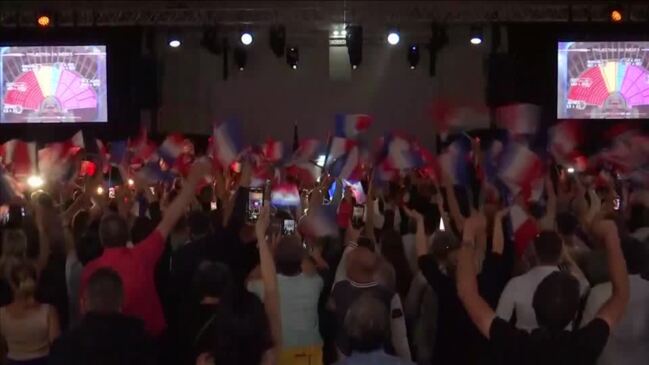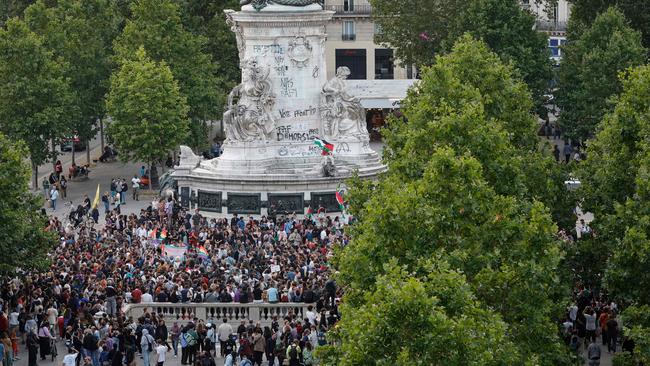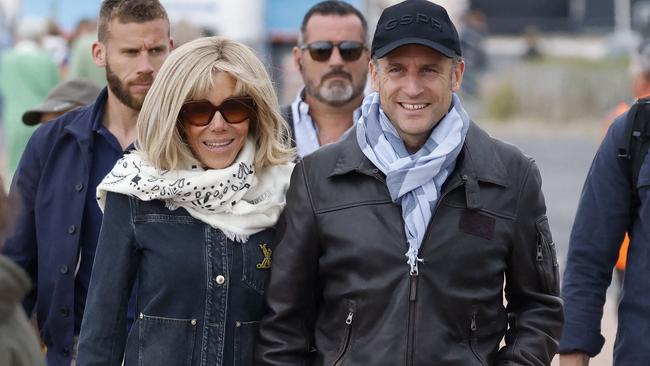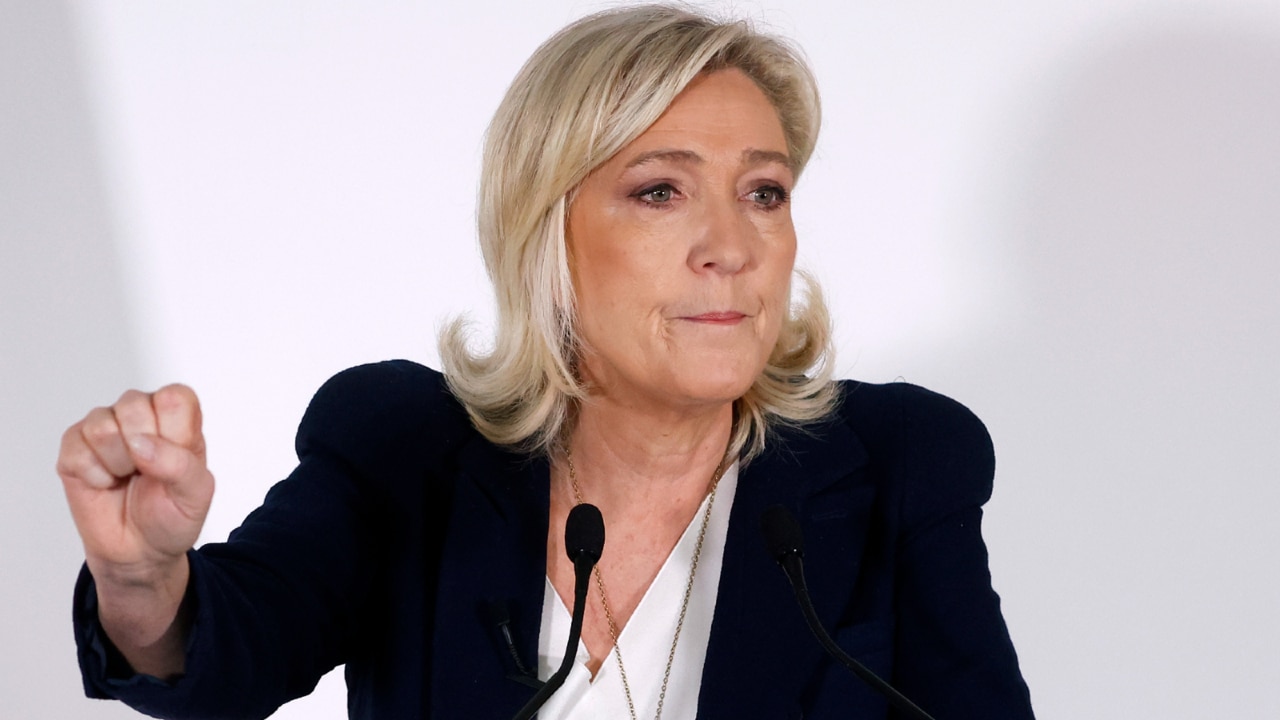Divide over antisemitism in France weakens unity against far right
Divisions over antisemitism and the Gaza war have left Marine Le Pen’s opponents at odds on whether to band together to stop her from winning a majority of seats in the final round.

Deep divisions in France over antisemitism and the Gaza war have left Marine Le Pen’s opponents at odds on whether to band together to stop her party from winning a majority of seats in the final round of parliamentary elections.
The discord was already apparent the morning after Le Pen’s first-round victory, with leaders of President Emmanuel Macron’s party accusing some far-left candidates of antisemitism and refusing to endorse them. Persuading third-place candidates to step aside and provide an endorsement is a crucial step this week if Le Pen’s opponents want to impede her party from winning control of the 577-seat National Assembly after the second round of the elections on Sunday. Such an outcome would compel Macron to pick a prime minister from her ranks.
The Oct. 7 attack by Hamas in Israel and the war in Gaza have inflamed French politics, making antisemitism and criticism of Israel key wedge issues in the elections. The far-left France Unbowed party has stridently criticised Israel, drawing accusations from Macron’s government that its rhetoric is fuelling a sharp increase in antisemitic acts in France.
Le Pen and other National Rally leaders joined the attack against the far left and defended Israel, with the party seizing the moment to make the case that it has renounced its history of antisemitism that long made it radioactive in French politics. France is home to Europe’s biggest Jewish community and one of its biggest Muslim minorities.

The move appeared to pay dividends on Sunday, helping push the National Rally to one of the best election showings in French politics in the past 20 years. Turnout was high, and the party won more than 9.3 million votes, the most of any party in the first round of French legislative elections since 2007 when France’s centre-right party won more than 10 million. National Rally and its allies captured 33% of votes cast, compared with the party’s 19% share in the first round just two years ago.
Le Pen’s political ambitions, however, have been thwarted in previous elections by France’s two-round voting system, which encourages voters to coalesce around mainstream candidates rather than ones at the far end of the political spectrum. With accusations of antisemitism now rising against far-left candidates and fading for Le Pen, voters are having a hard time deciding which side is more extreme.
The New Popular Front, an alliance of leftist parties that includes France Unbowed, came in second with 28% of the vote, while Macron’s party came in third with 21%. The alliance’s platform condemns the Hamas attack as a “terrorist massacre” and says “all those who spread hatred of Jews must be fought.” Jean-Luc Melenchon, the fiery leader of France Unbowed, said candidates of the leftist alliance in districts where they came in third should drop out, creating a head-to-head matchup in those cases between the National Rally and Macron’s party.
“Our order is simple, direct and clear: Not one vote, not one seat more for the National Rally,” Melenchon said at a rally on Sunday night.

The leaders of Macron’s party weren’t prepared to do the same. They said some members of France Unbowed have crossed the line into antisemitism with their comments about Israel since Oct. 7.
“I will not today endorse this extremist fringe of France Unbowed,” Yaël Braun-Pivet, a politician from Macron’s party who until recently was president of the National Assembly, said on Monday morning.
Braun-Pivet, whose father is Jewish, faced a barrage of antisemitic insults and threats after Oct. 7. Someone sent her a letter threatening to decapitate her, she said.
Melenchon gave his speech standing next to Rima Hass a n, a controversial figure in France Unbowed who is under investigation for remarks after Oct. 7 that allegedly condoned terrorism, a crime in France. Hassan, who was elected to the European Parliament in June, responded “true” when asked whether Hamas’s actions were legitimate.
“It was a provocation,” Braun-Pivet said when asked about Hassan’s appearance at last night’s rally.
Finance Minister Bruno Le Maire, a member of Macron’s party, called for voters to back candidates in the Popular Front that were from the Socialist Party and the Greens but not those from France Unbowed.
“France Unbowed is against the French nation,” Le Maire said, “France Unbowed is antisemitism.” The party’s leaders condemn antisemitism even as they sometimes seem to minimise it. Melenchon stoked controversy last month when he wrote that antisemitism in France is “residual.” France Unbowed leaders say their vociferous criticism of Israel doesn’t cross the line into antisemitism.
“Waving a Palestinian flag, that doesn’t mean you’re an antisemite,” said Manuel Bompard, the party’s national co-ordinator.

Sunday night’s results suggest France is drifting toward the nationalist, anti-immigrant sentiment that has swept the West in recent years, including Brexit, the 2016 election of Donald Trump, and the election victory of Italian Prime Minister Giorgia Meloni.
Macron and the party he founded couldn’t tack quickly enough, despite recent efforts to tighten France’s immigration laws. The vote share of his party and its allies, 21%, was down from 26% two years ago. Analysts expect it will lose many of the 245 seats it held in the National Assembly, a crushing setback for a party that was seen as the avatar of a new style of technocratic governance that transcended ideological boundaries when Macron founded it in 2016.
Voters were increasingly looking for politicians who would crack down on immigration and tamp down the influence of Islam in French public life.
What held National Rally back is the historical stigma that many French voters still attach to the party. The party was founded by Le Pen’s father Jean-Marie, who called the Nazi gas chambers a “detail” of World War II history, and Pierre Bousquet, a former member of the French division of the Waffen-SS.
Marine Le Pen has spent years distancing the party from its founders. Recently its leaders have been among the most outspoken defenders of Israel in French politics. Many French Jews say they wouldn’t hesitate to vote for her party if the alternative were a candidate from the leftist alliance. That sentiment has helped lift the stigma around her party.
Meanwhile, the public has drifted toward its sharp stance against immigration. National Rally campaigned on restricting the rights of foreign residents living legally in France and tightening access to citizenship, welfare and housing. It also aims to rewrite parts of the French constitution, abolishing the right to citizenship for the children of foreigners who are born in France. The party wants to bar women from wearing Muslim headscarves in any public space – including the sidewalks of Paris – though National Rally’s president, Jordan Bardella, has recently said the stance won’t be a priority.
Dow Jones





To join the conversation, please log in. Don't have an account? Register
Join the conversation, you are commenting as Logout